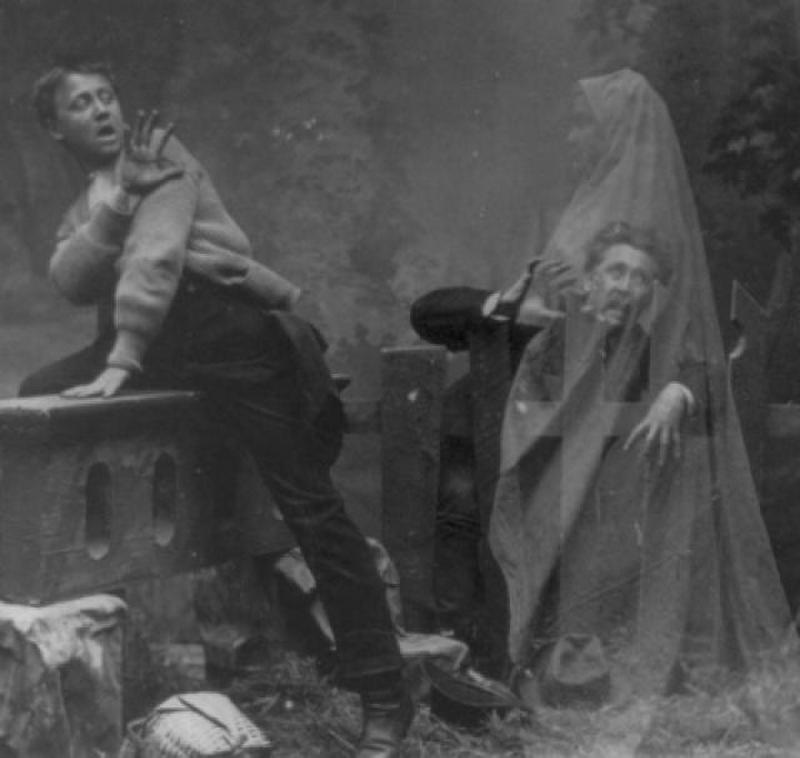Do Ghosts Exist? History May Say Yes. Here's Why Apparitions Are Likely 'Real'
By | October 28, 2020

What happens after we die? It's a question that's haunted humanity since we became aware of the concept of death, with answers ranging from a void of nonexistence to various religious hypotheses to The Grudge. As improbable as a haunting might seem to the scientific mind, it does seem strange that claims of it have popped up throughout history. What were they actually seeing? Do ghosts exist?
Wishful Psychosis
In 1917, Sigmund Freud theorized that people who saw the phantoms of their deceased loved ones were actually mired in "wishful psychosis,” or a fleeting bout of madness brought on by their own despair. He believed that patients who were convinced they could smell their dead loved one, hear their voice, or actually speak with them were clinically dependent on the person in question, so rather than investigate their claims, he counseled them to move on and cut the dead out of their lives.

The Society For Psychical Research
Whether or not his conclusions were sound, Freud may have been on to something with the concept of grief manifesting physically. Some have theorized that what these people were experiencing—and still experience today—is simply a buildup of grief and psychic energy that science hasn't tried to quantify because it's too "out there." After all, until we had the right instruments to measure them, things like radio waves and atomic particles seemed just as far-fetched as ghosts.
In fact, supposed paranormal experiences may be way more widespread than commonly believed exactly because people are worried they'll sound bonkers if they tell anyone. In 1889, London's Society for Psychical Research (or S.P.R.) asked 410 volunteers whether they'd witnessed a spectral apparition of some kind, and 13% of their subjects admitted to experiencing the phenomenon. After similar investigations carried out in the United States, France, Germany, Russia, and Brazil yielded 17,000 responses, the S.P.R. concluded that 7–19% of the population will witness what they perceive to be a paranormal event in their lifetime. Ethical philosopher Henry Sidgwick noted that many of the people who claimed to see an apparition were seeing a loved one near the moment of their death:
There is a marked accumulation of cases about the time of the death. They occur during fatal illness, whether this is known or unknown to the percipient, in increasing frequency as the death approaches—the largest number being reported as happening at or about the time of the death itself.
These weren't crackpots looking to walk around haunted houses. The S.P.R. were people of science, eager to plumb the depths of the human mind. One member was Alfred Russel Wallace, co-developer of the theory of evolution, who butted heads with Charles Darwin over whether or not natural selection explained consciousness.

Do Ghosts Exist?
The group's conclusion that a significant percentage of the population has intuited bad things happening to the people they love suggests the existence of a telepathic energy in the ether that some people are simply more adept at tapping into, albeit accidentally. In some cases, that energy seems to take the form of a vision, but it's just as possible to be the sound of a voice or the way a person's shirt smelled on a particularly important day.
That all sounds like hokum, but that's just because there's no way to prove or disprove a vague sensation. Without the proper tools to measure this theoretical energy, no one in the S.P.R. could figure out exactly how people might accidentally tune into the telepathic world with their emotions, so the study kind of ended there. By the early 20th century, the field of psychology was trying to move away from mysticism in any form, so they stopped investigating the possibility of life after death, even in the form of energy.

Non-Western Cultures
Western psychology tends to sidestep the belief in ghosts, but in 1996, psychologist Dennis Klass proposed weaving the memories of the dead with the interactions of the living to help them recover from their grief. Rather than cut off all bonds with a loved one who passed on, as Freud advised, Klass believed it was important for people to stay in contact with the dead. One researcher studying widows who continued interacting with their spouses explained:
The widows who continued to have vivid illusions of perceiving the deceased did not differ from other widows in the study in their acceptance of death ... They also did not seem to be more isolated socially or to perceive themselves as more abandoned. They seemed rather to be better at this style of expressing grief, more accepting of it and more convinced of its meaning.
This kind of ongoing conversation with the dead as a means of working through grief may not jive with Western psychology, but it does go hand in hand with the traditions of non-Westerners. In one Japanese ritual, people leave out food and candles for the dead, and this seems to psychologically prepare them to handle a big emotional shift. Scientists are still studying the psychological effects of grief all over the world, but "to date," according to one researcher, "no study specifically explores the neurofunctional correlates of visual hallucinatory phenomena in the bereaved population."

